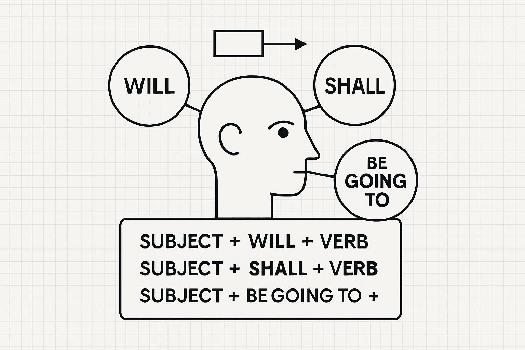Anglais > Grammaire Anglaise > Les Temps Verbaux (The Tenses) > Future Simple (will, shall, be going to - utilisation et formation)
Le Futur Simple en Anglais: Will, Shall, Be Going To
Maîtrisez l'utilisation et la formation du futur simple en anglais (will, shall, be going to). Cours complet avec exemples et exercices adaptés aux lycéens.

Introduction au Futur Simple
Le futur simple en anglais est utilisé pour exprimer des actions ou des événements qui se produiront dans le futur. Il existe plusieurs manières d'exprimer le futur, notamment avec 'will', 'shall', et 'be going to'. Chacune a des nuances d'utilisation qu'il est important de comprendre.
Will: Formation et Utilisation
La forme 'will + verbe à l'infinitif sans to' est la plus courante pour exprimer le futur simple. Formation:
- Affirmative: Subject + will + base form of the verb (I will go)
- Negative: Subject + will + not + base form of the verb (I will not go) (forme contractée : won't)
- Interrogative: Will + subject + base form of the verb? (Will I go?)
- Prédictions générales: 'It will rain tomorrow.'
- Décisions prises au moment de parler: 'I'll answer the phone.'
- Promesses: 'I will help you with your homework.'
- Offres: 'I will carry your bag.'
- Requêtes: 'Will you please close the door?'
Exemples:
- I will travel to Paris next year.
- She won't be late for the meeting.
- Will you come to my party?
Shall: Formation et Utilisation
Traditionnellement, 'shall' est utilisé avec 'I' et 'we' pour former le futur. Cependant, son utilisation est de moins en moins fréquente et souvent remplacée par 'will', surtout en anglais américain. Formation:
- Affirmative: I/We + shall + base form of the verb (I shall go)
- Negative: I/We + shall + not + base form of the verb (I shall not go) (forme contractée : shan't)
- Interrogative: Shall + I/we + base form of the verb? (Shall we go?)
- Suggestions: 'Shall we go for a walk?'
- Offres (moins courant que 'will'): 'Shall I help you?'
- Dans un contexte formel: 'We shall overcome.'
Exemples:
- Shall we dance? (Suggestion)
- I shall remember this day forever. (Formel)
Be Going To: Formation et Utilisation
'Be going to' est utilisé pour exprimer des intentions ou des prédictions basées sur des preuves présentes. Formation:
- Affirmative: Subject + be (am/is/are) + going to + base form of the verb (I am going to go)
- Negative: Subject + be (am/is/are) + not + going to + base form of the verb (I am not going to go)
- Interrogative: Be (Am/Is/Are) + subject + going to + base form of the verb? (Are you going to go?)
- Intentions planifiées: 'I am going to visit my grandmother tomorrow.'
- Prédictions basées sur des preuves: 'Look at those dark clouds. It is going to rain.'
Exemples:
- They are going to get married next summer.
- She is not going to accept the job offer.
- Are you going to study tonight?
Différences clés entre Will et Be Going To
Il est important de bien distinguer 'will' et 'be going to'.
- 'Will' est utilisé pour des décisions spontanées, des prédictions générales, des promesses et des offres.
- 'Be going to' est utilisé pour des intentions planifiées et des prédictions basées sur des preuves présentes.
Exemples comparatifs:
- Will: 'The phone is ringing. I'll answer it.' (Décision spontanée)
- Be going to: 'I've already made plans. I am going to visit my friend tomorrow.' (Intention planifiée)
- Will: 'I think it will snow tomorrow.' (Prédiction générale)
- Be going to: 'Look at the sky. It's going to rain.' (Prédiction basée sur des preuves)
Exercices
Complétez les phrases suivantes avec la forme correcte du futur simple (will, shall ou be going to):
- I ________ (travel) to Italy next summer.
- Look at those dark clouds! It ________ (rain).
- ________ you (help) me with this exercise?
- They ________ (get) married in June.
- We ________ (have) a party next weekend.
Afficher les réponses
- will travel / am going to travel
- is going to rain
- Will / Shall
- are going to get
- will have / are going to have
Ce qu'il faut retenir
- Will: Décisions spontanées, prédictions générales, promesses, offres.
- Shall: Suggestions (avec 'I' et 'we', moins courant).
- Be going to: Intentions planifiées, prédictions basées sur des preuves.
- Formation:
- Will: Subject + will + base form of the verb
- Shall: Subject + shall + base form of the verb
- Be going to: Subject + be (am/is/are) + going to + base form of the verb
- Attention: Bien distinguer 'will' et 'be going to' selon le contexte.
FAQ
-
Quelle est la différence entre 'will' et 'be going to'?
'Will' est utilisé pour les décisions spontanées et les prédictions générales, tandis que 'be going to' est utilisé pour les intentions planifiées et les prédictions basées sur des preuves présentes. -
Quand utiliser 'shall'?
'Shall' est principalement utilisé pour faire des suggestions avec 'I' et 'we' (par exemple, 'Shall we go?') et, de façon plus formelle, dans certaines expressions ou documents.
